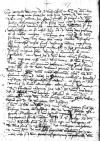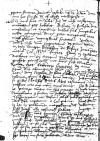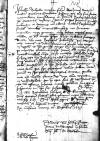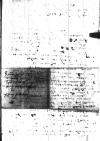 AAWO, AB, D. 68, f. 147r
AAWO, AB, D. 68, f. 147r
Si intercapedo litterarum a me ad Dominationem Vestram, Carissime ac Reverendissime mi Domine, tam longa tamque muta fuit, hoc mihi vitio vertere Dominatio Vestra non debet nec credere hoc factum fuisse, quod animum a Dominationis Vestrae studio abalienarim et quod de summo meo erga Dominationem Vestram ... illegible⌈...... illegible⌉ amore aliquid detractum sit. Nam tam dolui vehementer, quam qui vehementissime, et quod nihil litterarum ad Dominationem Vestram dare potuerim, et quod nullas acceperim. In causa fuere, quominus ad Dominationem Vestram scriberem, varii tam terrae, quam maris itinerum discursus, quibus longo tempore versati sumus versamurque continuo, neque finem conspicimus, et occupationes multae, quibus in his permutationibus detineri maxime soleo.
Ubicumque enim advenimus, ibi nova suppellectile, nova domus, ut Dominatio Vestra bene novit, struenda est. Neque erat mihi notum, ubi nam terrarum Dominatio Vestra Reverendissima incola esset et quam provinciam habitaret, neque habui nuntium certum, quem ad Dominationem Vestram venturum putarem et meas litteras redditurum. Nunc tamen, nobis adveniente carissimo nostro domino ⌊Fabiano⌋, rescivi Dominationem Vestram in ⌊Pruciam⌋ incolumem et benevalentem residere, quod nobis gratissimum accidit, et statim, cum dominus ⌊Cornelius⌋ in aulam advenisset, eodem sermone affirmavit. Cui in ⌊Flandriam⌋ redeunti has ad Dominationem Vestram dare decrevi, ut Dominationem Vestram Reverendissimam non lateret illustrem dominum meum, dominum ⌊Granvelam⌋, nosque omnes divina favente clementia perbelle valere. Quod etiam de Dominatione Vestra optare non desistimus.
Carissime mi Domine.
Cum illustris ⌊dominus⌋ meus indies magnis suis me beneficiis ornare non desistat, ita ut umquam solvendo esse queam, vellem a Dominatione Vestra hoc unum impetrare paper damaged⌈[re]re paper damaged⌉, quod me impetraturum facile confido, videlicet, quod Dominatio Vestra scribat ad dominum meum, referendo gratias de sua amica erga me voluntate et de tantis suis in me beneficiis, ut intelligat me habere Dominationem Vestram Reverendissimam de mea felici fortuna non condolentem. Hac in re morem mihi si Dominatio Vestra gerat, si promereri non potero Dominationi Vestrae,  AAWO, AB, D. 68, f. 147v perpetua servitute devinctum restabo. Non tamen Dominatio Vestra dicat a me hoc scivisse, tamen ab aliquibus intellexisse.
AAWO, AB, D. 68, f. 147v perpetua servitute devinctum restabo. Non tamen Dominatio Vestra dicat a me hoc scivisse, tamen ab aliquibus intellexisse.
⌊Dominus⌋ meus fecit cum filio suo, ut mihi resignaret canonicatum, quem habebat Bisantii in ecclesia Divae Magdalenae, et expedivit bullas suis sumptibus, credo, octaginta ducatos, pariter receptionem canonicis persolvit viginti duos scutatos. {U}Ultra dedit mihi unam exspectativam, videlicet primam vacantem in toto ⌊commitatu Burgondiae⌋ de beneficiis iuris patronatus ⌊caesareae maiestatis⌋. Fuerat quidam in extremis, dicebant eum esse mortuum, procurator meus accipiebat poss ms. c(!)
⌈ssss ms. c(!)
⌉essionem meo nomine, sed convaluit. Valor erat trecentorum scutatorum in anno.
Etiam ⌊dominus⌋ obtinuit a⌊ maiestate caesarea⌋ pro me thesaureratum Divi Nicolai de Baro per obitum domini ⌊Crisostomi Colonna⌋, quem Dominatio Vestra bene novit. Intromiserat se quidam Barensis, dictus Abas Rosmanus, et pacifice octo aut novem annis tenuit. Sed quia habuerat hidden by binding⌈[at]at hidden by binding⌉ a ⌊principe Orangiae⌋, tunc temporis prorege in dicto ⌊regno Neapolitano⌋, qui quidem non habebat potestatem dandi dictum thesaureratum nec beneficium aliquod iuris patronatus, ideo dominus impetravit a ⌊caesare⌋ pro me. Sumus tamen in lite in parlamento Neapolitano, ut videant, si quid iuris ille Rosmanus habeat. ⌊Imperator⌋ tamen nunc misit litteras ⌊proregi⌋, praesidenti consiliariisque dicti consilii Neapolitani dicens, quod eius voluntas numquam fuit dare potestatem dicto ⌊principi⌋ ad conferendum beneficium, et quod eius {u}ultima et determinata voluntas est, quod sim pacifice in poss ms. c(!)
⌈ssss ms. c(!)
⌉essione conservatus, et nemo audeat in contrarium venire aut murmurare. Spero brevi me finem habiturum, Deo duce.
 AAWO, AB, D. 68, f. 148r
AAWO, AB, D. 68, f. 148r
⌊Isabella Delgada⌋ nupsit filiam Da ⌊Ioanam Dantiscam⌋ cuidam ⌊Gratiano⌋, secretario Hispano, qui olim fuit servitor ⌊Maximiliani Transsilvani⌋ et denuum(!) ⌊episcopi Habulensis⌋. Iste ⌊Gratianus⌋ vestivit ⌊Ioanam⌋ prop<ri>is pecuni<i>s, priusquam nuberetur. Et extra<h>eret ⌊eam⌋ a domo ⌊matris⌋ vestimentis sericis, anulis aureis, torquibusque, nec deerant monilia, neque gemmae, neque cetera capitis ornamenta, et cum mag<n>a pompa fuit in domo Fucarorum ducta, ubi erat ⌊episcopus Habulensis⌋, qui accepit eorum manus, et dictus ⌊Gratianus⌋ promisit eam accipere in uxorem, et ipsa promisit accipere eum in maritum, et e written over ...⌈... illegible⌈...... illegible⌉ee written over ...⌉o momento Gratianus misit Ioanam ad matrem suam, quam adscribed⌈quamquam adscribed⌉ ipse habet on the margin⌈ipse habetipse habet on the margin⌉ in ⌊Medina del Campo⌋, et sic remansit Isabella absque filia. Ego non interfui in istis ceremonis, quia non fui vocatus, sed ii, qui interfuerant, narraverunt mihi totam tragediam, et ipsa ⌊Isabella⌋ etiam recitavit. Ne<s>cio tamen, qua spe ⌊Gratianus⌋ voluit habere dictam ⌊Ioanam⌋, an spe praedae, an captus amore. Puella certe est eleganti forma, ut vix alia reperiatur in ⌊Valledoleto⌋. Hoc tamen aegre fero, quod, ut dicunt, ipse ego non affirmo, laborat morbo Gallico sive propius Hispanico, cum ipse sit Hispanus paper damaged⌈[us]us paper damaged⌉.
Dominatio Vestra meo nomine dignabitur salutare [...] paper damaged⌈[...][...] paper damaged⌉ dominum ⌊Bernardum⌋ et dominum ⌊Georgium⌋ fratres, quibus plurimum cupio commendari ceteribusque omnibus.
Dominus Ihesus Christus Dominationem Vestram Reverendissimam incolumem et longaevam tueatur.
 AAWO, AB, D. 68, f. 147v perpetua servitute devinctum restabo. Non tamen Dominatio Vestra dicat a me hoc scivisse, tamen ab aliquibus intellexisse.
AAWO, AB, D. 68, f. 147v perpetua servitute devinctum restabo. Non tamen Dominatio Vestra dicat a me hoc scivisse, tamen ab aliquibus intellexisse.


